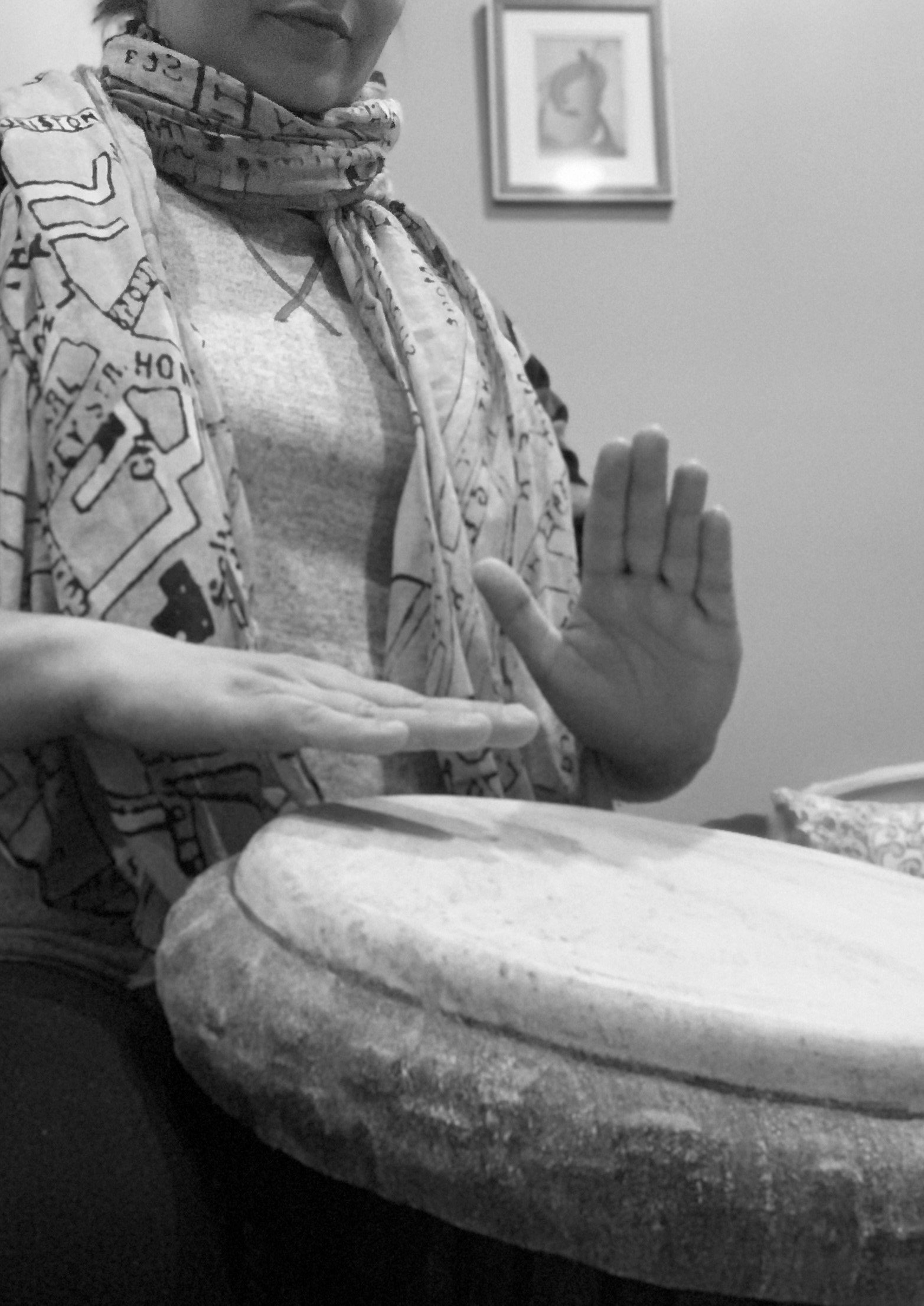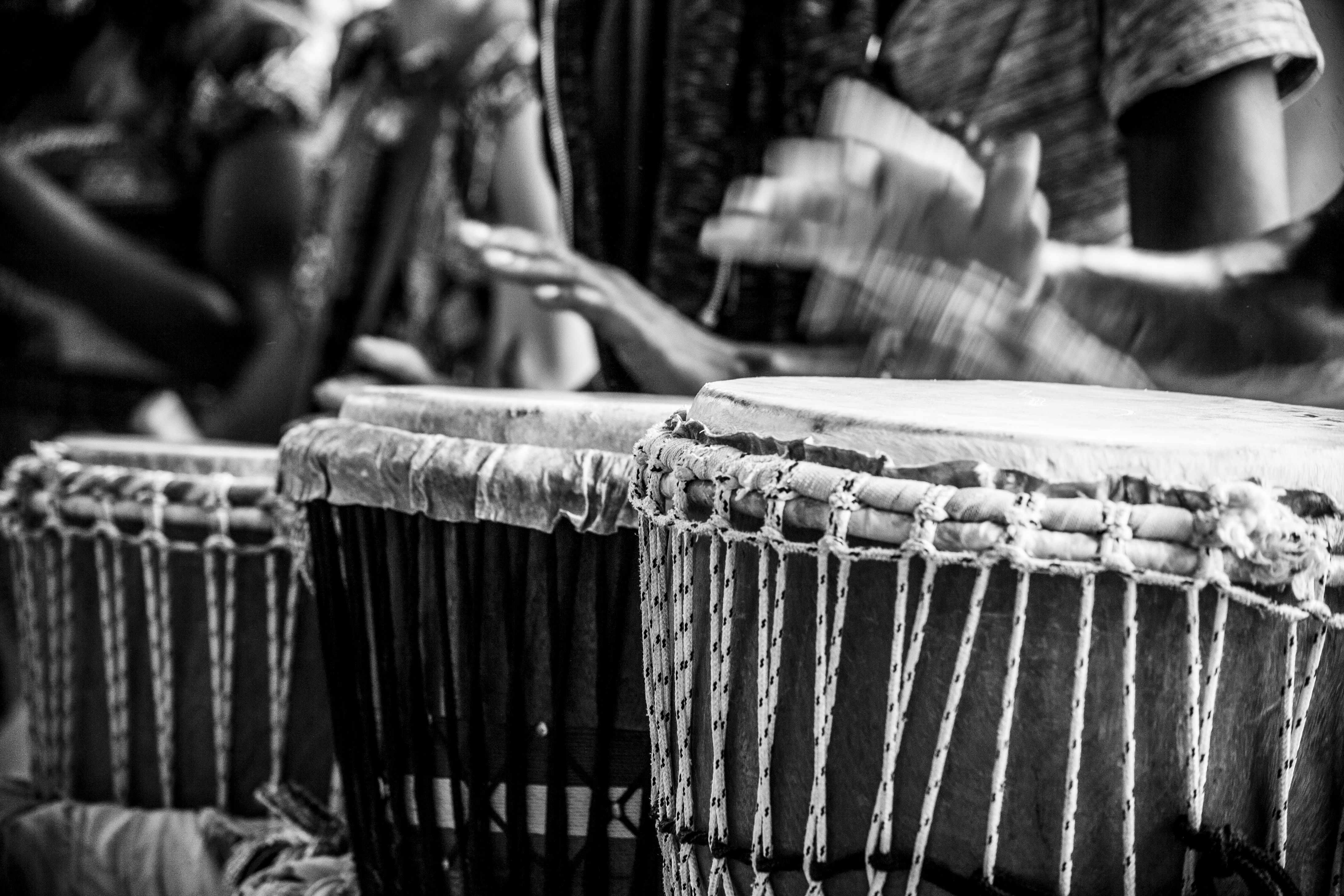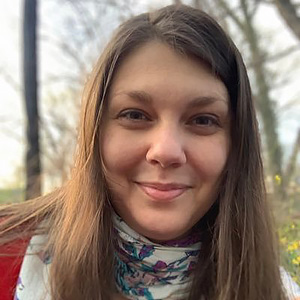Drumming myself into well-being
The sounds of West African instruments blast through the parking lot, and vibrations pulsate in my ear as I approach an open door. I hesitate, thinking, Do I belong here? The roaring beats tell me it’s an all or nothing decision.
I go for it, knowing that, as soon as I do, there’s no turning back. I’m committed, and I take comfort in knowing that the thunderous tone of the drum will fill any space I’ve made for my doubts and drown them out. Until about four months ago, I never thought to take up West African djambe drumming as an outlet and for the sake of my mental health and well-being. I’m a novice, but inexplicably, I feel this is what I’d been looking for, and I’m in it for the long haul.

I’ve found that entering a new phase in my life is exciting but often coupled with sacrifice. The meaningful changes in my life — starting a new job, moving far from home, starting a family, bringing up a child — have come with hard compromises, doubts and societal pressures. Now I factor in the trauma of living in a pandemic world (a divided and, arguably, broken world), and it can feel nearly impossible at times. On any given day, I put on different hats, ensuring needs are met, voices are heard and details are analyzed, and my thoughts run relay-style at warp speed to ensure everything is taken care of in a thoughtful and intentional way. It gets noisy, cluttered and utterly exhausting at times. I’ve found myself reflecting back on times I was more resilient; the hardships were there, but they were easier to bounce back from.
The closest I’ve ever come to feeling balanced or in some sort of Zen state was as an undergrad when I was an avid yogi; I built confidence through movement and breath, and I advised my peers to try yoga as a means of stress management. Between undergrad and grad school, I worked as a barista and read Haruki Murakami’s books on the train rides to a coffee shop in front of the European Union headquarters on a bustling street in Brussels. I was grounded. I had a strong sense of belonging.
For a period of my life after grad school, my work and creativity were intertwined. I traveled a lot, I inspired kids around the globe, and when people asked me what I did to tap into my creative side, I was able to say, “It’s in the job.” But this was not a balanced life, and I eventually felt run down. What happened to my easy confidence and assurance? I wished I could sit down, close my eyes and meditate to quiet the mind and sort through all the clutter in my head, but the sheer amount of noise was too intimidating.
It took me a while to figure out that I couldn’t go back to the outlets that had worked in the past. Actually, it took someone else giving me permission to try something different. They said, “Forget what’s not working … what else do you wish you could do?”
Without thinking, I said, “I want to learn to drum.”
This past fall, I went to see a dance studio where my daughter would be taking lessons. I peered through a glass window and saw more than 20 drummers seated, well spaced, in a perfect circle. I was in awe — I hadn’t seen a large room full of strangers in a very long time. The sounds thudded dully through the walls, but with every rhythmic beat, I saw the drummers’ unity and sense of purpose. They were focused, and each seemed to be a small part of something much bigger. I’m sure that some of the pull I experienced in that moment was my desire to heal from pandemic isolation. By playing the djambe in a group, I thought, I could connect with the people around me without uttering a word.
A drummer connects with the instrument and with the rhythm, getting out of their own head. I’m told the feeling can be transcendent. I’m not quite there yet. However, I have felt the intensity of the djambe drum match exactly what is going on inside me — the stress and anxiety. Any anger and frustration I’m holding on to from the day begins to dissipate. I’m forced to be accountable for the state of my physical body — becoming more aware of the tension I hold. The more relaxed I am, the easier it is to drum well.
The moment I capture a continuous rhythm and I’m in sync with 20 others in a circle, it’s empowering, and I can’t help but be present and smile. In yoga, there’s more space in my mind to drift from one thought to the next, and I struggle to come back to the breath and focus on the sensations — a common challenge for anyone. In drumming, every beat I make replaces a thought, and there’s less room for my mind to stray, because I must be entirely focused on the next beat. I drift for a split second, and I lose the rhythm. I get distracted a lot as a beginner, but I keep going. I try again.
Drumming is helping me relearn how to let go, quiet the mind and reconnect with my authentic self. It’s not a remedy, but it is a step toward actively seeking better mental health and well-being, and it is exactly what I need in this phase of my life.

Enjoy reading ASBMB Today?
Become a member to receive the print edition four times a year and the digital edition monthly.
Learn moreGet the latest from ASBMB Today
Enter your email address, and we’ll send you a weekly email with recent articles, interviews and more.
Latest in Opinions
Opinions highlights or most popular articles

Sketching, scribbling and scicomm
Graduate student Ari Paiz describes how her love of science and art blend to make her an effective science communicator.

Embrace your neurodivergence and flourish in college
This guide offers practical advice on setting yourself up for success — learn how to leverage campus resources, work with professors and embrace your strengths.

Survival tools for a neurodivergent brain in academia
Working in academia is hard, and being neurodivergent makes it harder. Here are a few tools that may help, from a Ph.D. student with ADHD.

Hidden strengths of an autistic scientist
Navigating the world of scientific research as an autistic scientist comes with unique challenges —microaggressions, communication hurdles and the constant pressure to conform to social norms, postbaccalaureate student Taylor Stolberg writes.

Black excellence in biotech: Shaping the future of an industry
This Black History Month, we highlight the impact of DEI initiatives, trailblazing scientists and industry leaders working to create a more inclusive and scientific community. Discover how you can be part of the movement.

Attend ASBMB’s career and education fair
Attending the ASBMB career and education fair is a great way to explore new opportunities, make valuable connections and gain insights into potential career paths.

